During the first decade of the new millennium, a growing number of risk-taking entrepreneurs with commitment to education have boldly stepped forward to promote and develop globally-benchmarked K-12 schools in the North-east
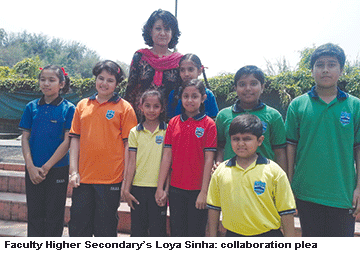 With parents, households and village and tribal communities in the highly literate states of North-east India well aware of the critical importance of primary and secondary education, the eight states of the region boast a large number of quality private and government schools. Moreover with Protestant and Catholic Christian missionaries having been active for well over a century in the region and the leading states of Assam and Meghalaya (the focus areas of this EducationWorld investigative feature) in particular, even government schools tend to be well ahead of their counterparts in most states of mainland India.
With parents, households and village and tribal communities in the highly literate states of North-east India well aware of the critical importance of primary and secondary education, the eight states of the region boast a large number of quality private and government schools. Moreover with Protestant and Catholic Christian missionaries having been active for well over a century in the region and the leading states of Assam and Meghalaya (the focus areas of this EducationWorld investigative feature) in particular, even government schools tend to be well ahead of their counterparts in most states of mainland India.
The quaint stereotypical image of noble yet ignorant tribals, which even academics in the educationally backward BIMARU (Bihar, Madhya Pradesh, Rajasthan and Uttar Pradesh) states and peninsular India entertain of the North-east, is date-expired. Although proud of their native and tribal tradition and cultures, the region’s overwhelming majority of youth are literate and over 50 percent English literate.
Nevertheless because higher education has traditionally been neglected in the North-eastern states until very recently, resulting in a shortage of well-trained educators, and teachers from mainland states reluctant to migrate to this ‘foreign’ region plagued by deep-rooted law and order problems, the top schools in the region compare unfavourably with the best in mainland India. Until the early years of the new millennium when the Assam Valley School (AVS, estb. 1995) was promoted and developed into a Top 10 ranked co-ed boarding school during the past decade, it was rare for children from mainland states to be sent to schools in the region. The furthest north-east that upper middle and elite households were prepared to send their children to was Darjeeling which boasts the famous boarding schools of St. Paul’s, St. Joseph’s and Loreto Girls.
But during the first decade of the new millennium, a growing number of risk-taking entrepreneurs with commitment to education have boldly stepped forward to promote and develop high-quality, globally benchmarked primary-secondary schools in the North-east. For instance, the Assam Valley, Balipara, Miles Bronson, Royal Global and GEMS NPS International (all Guwahati) schools are routinely ranked among the country’s Top 25 in their various categories (day, day-cum-boarding, legacy boarding, and international etc) in the annual EducationWorld India School Rankings. Moreover there are several other low-profile schools in Assam and Meghalaya which would be ranked if they projected a sufficiently high profile to attract the attention of sample respondents in the eastern region.
FOR INSTANCE, a k-12 school which has earned an excellent reputation in Guwahati, but not beyond, is the CBSE-affiliated, co-ed Faculty Higher Secondary School (estb. 1982). Sited on an idyllic 20-acre campus on the banks of the river Brahmaputra in north Guwahati, it has an aggregate enrollment of 1,400 students mentored by 70 faculty. With a built-up area of 70,000 sq. ft, the school is equipped with excellent infrastructure including biotech, language and computer labs and sports facilities for volleyball, basketball and cricket among other field games, while levying modest tuition fees of Rs.65-75,000 per year. 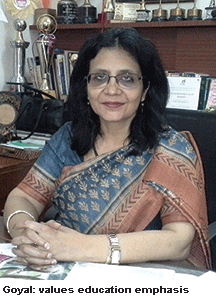
“Faculty Higher has played a pioneering role in introducing the concept of holistic education – excellent academics and extra-curricular activities — to develop well-rounded students in Guwahati, and beyond. Nevertheless although many new schools offering great infrastructure and facilities have mushroomed in the city, classroom pedagogies, curriculum development and teacher training haven’t kept pace. Private schools in the North-east need to learn from and collaborate with top-ranked schools in mainland India to upgrade standards,” admits Loya Sinha, an alumna of Pune University and IGNOU, Delhi who took over the management of the school from her parents — Banti and Pradip Kumar Bhuvan — who promoted Faculty Higher three decades ago.
Rising demand for quality education in the North-east and Assam in particular, has also attracted the attention of the Birla family, one of the most well-known names of the business world and which has voluntarily contributed to the growth and development of education countrywide through the promotion of excellent institutions including the Birla Institute of Technology & Science, Pilani, Ashok Hall, Kolkata, and Sarala Birla Academy, Bangalore, among others. In 2004, the Kolkata-based Sarala Birla Group of Schools, promoted by a branch of the Birla clan (chaired by Ms. Jayashree Mota), which runs seven primary-secondaries across the country and the Birla Institute of Management (BIMTECH), Noida, promoted the CBSE-affiliated Sarala Birla Gyan Jyoti School, Guwahati (SBJS). Since then, this low-profile school has established an excellent reputation within Guwahati and Assam.
“sarala birla gyan jyoti has brought progressive school education to Guwahati. Our focus is not only on academic achievement but all-round development. We provide holistic education which combines academic rigour and the excitement of experiential learning with extra-curricular and sports education. The emphasis is on values education, life skills training, technology-enabled learning, games and outdoor activities. This new approach to education has been embraced by the parents community in Guwahati with applications for admission far exceeding the number of seats available,” says Anubha Goyal, principal of the co-ed SBGJS, a day school with an enrollment of 1,700 students mentored by 100 teachers (tuition fee: Rs.60,000-70,000 per year). Enthused by public response, the Sarala Birla Group is drawing up plans to promote two new K-12 schools in Silchar and Jorhat (Assam).
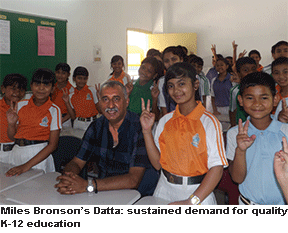 The emergence of a newly affluent upper middle class in the North-east has also prompted promotion of several high-end boarding and day-cum-boarding schools in Assam and Meghalaya. Top-ranked among them is the capital-intensive, wholly-residential Assam Valley School, Balipara promoted by Brij Mohan Khaitan, chairman of Williamson Magor & Co. Ltd, one of the world’s largest tea plantation companies, and set within a 270-acre campus in the Balipara tea estate owned by the company. During the past 19 years, the CISCE-affiliated AVS (annual tuition fees: Rs.2 lakh) has quickly established a nationwide reputation and is routinely ranked among the country’s Top 10 co-ed boarding schools and #1 in eastern India. Other boarding and day-cum-boarding schools which have sprung up in Guwahati and are attracting students from across the North-east are the Miles Bronson Residential School, Royal Global and GEMS NPS, all co-ed K-12 institutions affiliated with the Delhi-based CISCE/CBSE exam boards.
The emergence of a newly affluent upper middle class in the North-east has also prompted promotion of several high-end boarding and day-cum-boarding schools in Assam and Meghalaya. Top-ranked among them is the capital-intensive, wholly-residential Assam Valley School, Balipara promoted by Brij Mohan Khaitan, chairman of Williamson Magor & Co. Ltd, one of the world’s largest tea plantation companies, and set within a 270-acre campus in the Balipara tea estate owned by the company. During the past 19 years, the CISCE-affiliated AVS (annual tuition fees: Rs.2 lakh) has quickly established a nationwide reputation and is routinely ranked among the country’s Top 10 co-ed boarding schools and #1 in eastern India. Other boarding and day-cum-boarding schools which have sprung up in Guwahati and are attracting students from across the North-east are the Miles Bronson Residential School, Royal Global and GEMS NPS, all co-ed K-12 institutions affiliated with the Delhi-based CISCE/CBSE exam boards.
“With the emergence of a new class of professionals and business entrepreneurs in the North-east, there’s strong and sustained demand for quality K-12 education. In particular, there’s a great need for new high-quality schools on the outskirts of Guwahati and smaller towns of Assam and the North-east,” says Dr. Nripen Datta, promoter-principal of the wholly-residential, co-ed Miles Bronson (average tuition fee: Rs.2.50 lakh per year). The success of MBRS, which hosts 635 students, has encouraged Datta to draw up plans to promote a wholly IBO (Geneva)- affiliated school within the next five years. 
The phenomenon of pressing demand for qualitative education at all levels in the North-east and Assam in particular, is seconded by Ashok Kumar Pansari, a chartered accountant and real estate heavyweight of Guwahati who has invested an estimated Rs.250 crore in establishing the Royal Group of education institutions (aggregate student enrolment: 2,000) which includes The Royal colleges of engineering, and commerce and the high-end CBSE-affiliated Royal Global School (estb. 2012) which was ranked Assam’s #1 day-cum-boarding school in the EW India School Rankings 2013.
“The promotion of DPS, Guwahati in 2003 by us and the excellent public response to it was a turning point which prompted a number of modern, new generation educationists to establish early childhood and primary-secondary schools in Guwahati. Since then, the latent demand for high-quality 21st century schools and professional education institutions has spiraled. Until 2003, there was a false perception that the entire North-east — rather than small tribal pockets — had law and order problems. By promoting our capital-intensive schools and colleges, we have met pent-up demand and also demonstrated to business and industry that it’s safe and profitable to invest in Assam,” says Pansari
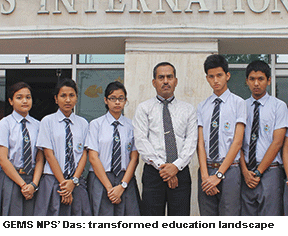 EVEN IF GEOGRAPHICALLY and geopolitically, the eight states of North-east India are seen to be cut off from the rest of the country, the revolution of rising expectations manifested by pressing demand for quality education is real within them, says Jitendra Nath Das, promoter-chairman of the CBSE-affiliated, co-ed GEMS NPS International School (estb. 2005) which has an aggregate enrollment of 1,000 students mentored by 56 teachers, and has been recording excellent academic results in the CBSE class X and XII board exams.
EVEN IF GEOGRAPHICALLY and geopolitically, the eight states of North-east India are seen to be cut off from the rest of the country, the revolution of rising expectations manifested by pressing demand for quality education is real within them, says Jitendra Nath Das, promoter-chairman of the CBSE-affiliated, co-ed GEMS NPS International School (estb. 2005) which has an aggregate enrollment of 1,000 students mentored by 56 teachers, and has been recording excellent academic results in the CBSE class X and XII board exams.
“The states of the north-east have not been left untouched by the academic revolution sweeping across the country. New schools, engineering and medical colleges, private universities and polytechnics have sprung up during the past eventful decade in which the education landscape has been completely transformed. Today the North-east states house an IIT, IIM, an AIIMS-level medical college, the Tata Institute of Social Sciences, seven NITs, 11 medical colleges, an open university and five-six private universities. There’s also a proposal to set up an umbrella technical university to promote engineering colleges in the region. GEMS NPS International is also playing a role in the transformation of education in the North-east. We are the first school in the region to introduce CBSE-i, the international curriculum of CBSE,” adds Das.
The outcome of the buzz about quality education in the North-east is that even early childhood education, a new concept in Indian education to which even the omniscient babus in the Union HRD ministry and egg-heads of the Planning Commission have only recently woken up (as indicated in the National Early Childhood Care and Education Policy, 2013), has impacted itself upon discerning households in the region. 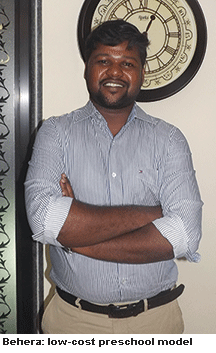
The Bangalore-based Balvan Learning India Pvt. Ltd, a company promoted in 2012 by Soumen Das, an alum of IIT-Guwahati, Michigan University and IIM-Lucknow, and Pratap Behera (NIT-Trichy and IIM-Lucknow) which runs the somewhat prosaically nomenclatured Kindergarden chain of preschools, comprising four preschools in Bangalore and two in Bhubaneswar, has also promoted five preschools in Guwahati, and one each in Silchar, Hojai (Assam) and Dimapur (Nagaland) under the franchise model. Aggregate nationwide enrolment: 400 students and 60 teachers.
“There’s growing awareness in this region of the importance of early childhood education on which all future learning is built. Our prime objective is to promote preschools in the rural hinterland of the country where we also educate parents about the need for professionally administered early childhood education. To fulfill this goal, we have devised a low-cost preschool model for rural India where annual tuition fees range between Rs.14,000-16,000 as against Rs.25,000-30,000 in urban habitats. Over the next two years, we plan to franchise over 100 preschools including 40 in the North-east. We see a huge latent demand in this region for high-quality preschool education,” says Behera, the Bhubaneswar-based director of Kindergarden.
THE WIDER SOCIAL benefit of the flurry of private sector education initiatives in the long-forgotten states of North-east India and especially in the leader states of Assam and Meghalaya, is that it has impacted state government institutions. A case in point is the all-girls, K-12 Pine Mount School, Shillong (estb.1900), a day-cum-boarding school owned and managed by the Meghalaya state government. Unusually for a state government school, it’s affiliated with the Delhi-based Council for Indian School Certificate Examinations (CISCE) and enjoys an excellent reputation in Shillong with admission applications far exceeding the number of seats offered in kindergarten. Sited on a 7.6-acre campus, it has 1,600 girl students including 55 boarders and 70 teachers on its muster rolls. Tuition fees are a mere Rs.200 per month for day scholars and Rs.2,000 for boarders.
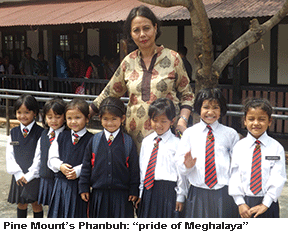 “Pine Mount School is the pride of Meghalaya. Despite being a government-controlled institution, we have managed to maintain excellent academic and co-curricular standards. Our students excel not only in board exams but also in sports, debates, drama, and elocution which are compulsory. However, since it’s over a century-old institution, many of our buildings are in urgent need of repair. The government needs to immediately invest in upgrading classrooms and other infrastructure to ensure Pine Mount maintains its premier status,” says Dorothy Rose Phanbuh, vice principal of the school.
“Pine Mount School is the pride of Meghalaya. Despite being a government-controlled institution, we have managed to maintain excellent academic and co-curricular standards. Our students excel not only in board exams but also in sports, debates, drama, and elocution which are compulsory. However, since it’s over a century-old institution, many of our buildings are in urgent need of repair. The government needs to immediately invest in upgrading classrooms and other infrastructure to ensure Pine Mount maintains its premier status,” says Dorothy Rose Phanbuh, vice principal of the school.
Clearly, an academic renaissance — perhaps even a revolution, larger than the minor insurrections driven by the complex geopolitics of the region — is sweeping Assam and Meghalaya, the leader states of India’s tenuously connected eight states of the North-east. While typically the Congress-led UPA-I and II governments embroiled in the “compulsions of coalition politics” did little to lend wings to the teaching-learning enthusiasm sweeping the region, private initiatives have filled the breach.
Now with a new single-party government swept to power in New Delhi, there’s a new opportunity for the Centre to aid and enable the governments of the eight North-east states — already blessed with high literacy and demonstrated passion for education — to develop excellent institutions of primary, secondary and higher education which will enable and empower the country’s Look East diplomatic and trade initiatives.